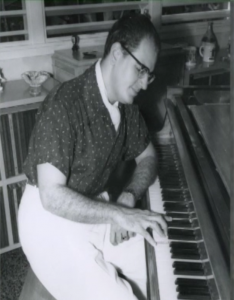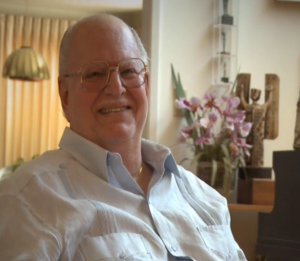CSUN Music Professor’s Life and Music Captured in Documentary
According to his father, “being a classical music composer in a country like Cuba was a perfect recipe for starvation,” but that didn’t stop California State University, Northridge music professor emeritus Aurelio de la Vega from chasing and achieving his dream of becoming a world-renown composer.
De la Vega’s journey from ostracized musician to internationally renowned composer is captured in the recent documentary, “Rebel with a Cause,” directed by Camilo Vila and narrated by Andy García.
“I knew Aurelio for quite a few years and I always felt that he was bigger than life,” said Vila. “I knew that his work had the gravitas to survive the ages, but no one knew the man I knew. I didn’t set out to do a biography of him, but more like a look at an artist and his relationship to the society he had to live in.”
De la Vega, a Latin Grammy nominee and recipient of numerous academic and musical accolades, said that for him “this documentary is a motive of personal happiness and rejoicing, but most important, it is a historical document of significant relevance, I want people to know that there is a serious classical music tradition in Cuba, beyond moving the hips.”
De la Vega was born in Havana, Cuba in 1925 and studied law at the University of Havana and music composition at the Conservatorio Ada Iglesias. He also studied independently with Fritz Kramer in Havana and Ernst Toch in Los Angeles. De le Vega served as cultural attaché in the Cuban Consulate in Los Angeles and toured the United States as a lecturer.
Like many musicians and other artists at the time of Fidel Castro’s rise to power, de la Vega was sent into exile. He made Los Angeles his home.
“The greatest solitude for an artist is to produce an artwork that the world recognizes, but that your own people are not able to receive,” said Velia Yedra, concert pianist and musicologist, about de la Vega’s experience.
Despite being cut off from his homeland, he remained an active composer and proud Cuban. Teaching at CSUN from 1959 until 1993, de la Vega continued composing and traveling around the world, expressing his thoughts, philosophy, emotions and life through music.
“I want to penetrate the curtain of propaganda and historical distortions put out by a totalitarian government that claims and proclaims that there was no culture in Cuba prior to 1959,” said de le Vega. “I want people to have some knowledge about my music and biography, which were erased from my place of birth for more than half a century.”
According to friends and colleagues, his music reflects his humor, playfulness, deep existential inquires, inescapable Cuban-ness and his very soul.
“What you hear in his music is Aurelio,” said William Toutant, composer and former dean of CSUN’s Mike Curb College of Arts, Media and Communication. “That’s his artistic integrity. There is an honesty about his music and it’s very refreshing.”
The documentary’s world premiere is being presented by Miami Dade College’s Koubek Center on Sunday, March 8, in Miami. A smaller viewing will happen later this year at CSUN.
“I hope viewers find how much integrity he had as an artist and how he never deviates from his vision,” said Vila. “Also that they appreciate how enthralling life in Cuba was at the time he was there.”
De le Vega’s list of compositions includes symphonic pieces, chamber music works, solo instrumental pieces, vocal works, piano, guitar, ballet and electronic compositions. Major orchestras and prominent soloists throughout the world have performed his works.
He has been the recipient of many prizes and distinctions, including having twice received the Friedheim Award of the Kennedy Center for the Performing Arts. In 2009, the Cintas Foundation in New York bestowed upon him the William B. Warren Lifetime Achievement Award “for his internationally acclaimed contribution to music composition.”
In 2000, the Library of Congress honored de la Vega when his graphic score, “The Magic Labyrinth,” was included in the library’s 733-page volume, “Music History from Primary Sources.” Among the music greats included with him were Bartók, Beethoven, Brahms, Chopin, Gershwin, Handel, Liszt, Mahler, Mendelssohn, Mozart, Puccini, Stravinsky and Verdi.
More than anything, de la Vega hopes that upon viewing the documentary, “people can perceive how the human spirit remains alive through art, even when facing political upheavals.”



 experience
experience